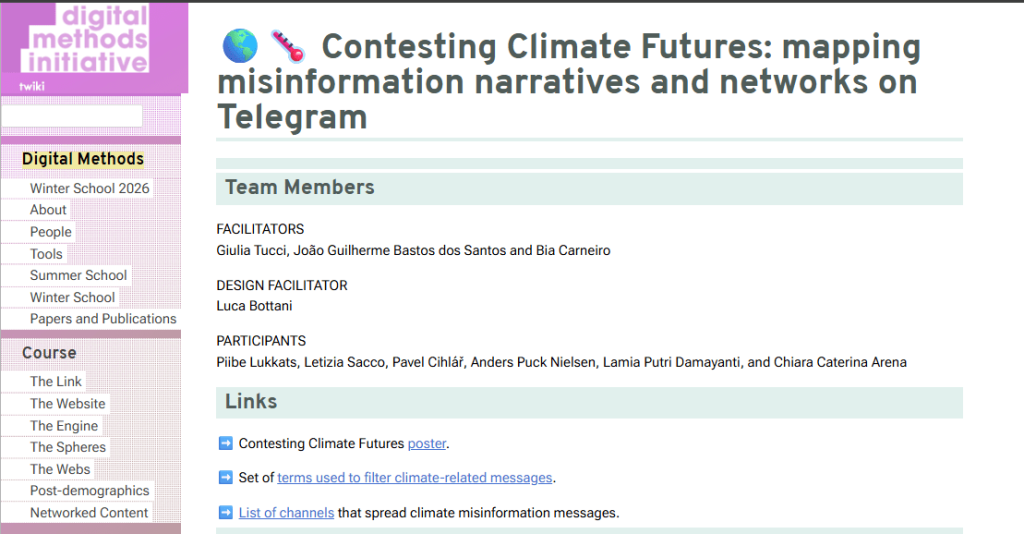Listen to the article
Climate Misinformation Thrives on Telegram, Research Shows
A new study has uncovered how climate change misinformation spreads through Telegram channels, revealing sophisticated narrative structures that blend conspiracy theories with pseudo-scientific claims.
The research, conducted during the 2025 Digital Methods Initiative Summer School, specifically examined climate-related content within public Telegram groups and channels as part of a project titled “Social media at a crossroads, and the sensitivity of AI platforms.”
Researchers Tucci, Bastos, and Carneiro employed specialized tools including TeleCatch software to collect data and Telegram Analytics to process and analyze the information. Their methodology involved first creating curated lists of relevant Telegram communities before extracting and analyzing the content shared within these spaces.
The findings reveal a complex ecosystem of climate misinformation that operates within what the researchers describe as an “apocalyptic meta-framework.” This framework combines several distinct but interconnected narratives that work to undermine legitimate climate science and policy efforts.
Central to these narratives are claims about weather modification technologies—often referring to chemtrails, HAARP (High-frequency Active Auroral Research Program), or cloud seeding—being used by governments or global elites for nefarious purposes. These are frequently presented alongside assertions that climate change is a “hoax” engineered to justify greater governmental control over populations.
The study found that such misinformation is particularly effective because it doesn’t simply reject climate science outright. Instead, it offers alternative explanations based on pseudo-scientific “counter-knowledge” that mimics the language and presentation of legitimate research while reaching radically different conclusions.
What makes these narratives particularly resilient is their community-building aspect. The research identified clear patterns of community mobilization within these Telegram groups, where members reinforce each other’s beliefs and collectively construct elaborate alternative explanations for observed climate phenomena.
The emotional dimension of these communications is significant. Content analysis revealed that climate misinformation on Telegram consistently appeals to emotional responses—particularly fear, suspicion, and distrust of established institutions. Posts frequently frame climate activism and policy as threats to personal freedom or as schemes benefiting shadowy global interests.
The research also uncovered monetization strategies embedded within these communities. Some influential channels promote products ranging from survival gear to “alternative energy” devices, suggesting that economic incentives may play a role in the production and amplification of climate misinformation.
This study comes at a critical time when Telegram’s user base continues to grow globally. Unlike many mainstream social platforms that have implemented content moderation policies addressing misinformation, Telegram’s minimal moderation approach has made it an attractive alternative for communities whose content might be restricted elsewhere.
The findings raise important questions about the role of alternative social media platforms in the climate information landscape. While platforms like Twitter, Facebook, and YouTube have faced public pressure to address climate misinformation, less visible spaces like Telegram may serve as incubators for narratives that eventually migrate to more mainstream discourse.
For climate communicators and policymakers, the research suggests that addressing misinformation requires understanding not just the false claims themselves, but the emotional and community contexts in which they thrive. Simple fact-checking may be insufficient when misinformation is embedded within cohesive worldviews that provide both explanation and identity to their adherents.
The researchers note that while their study focused specifically on climate misinformation, similar patterns may exist across other scientific topics that have become politically contested, suggesting broader implications for how societies navigate complex information environments in the digital age.
Fact Checker
Verify the accuracy of this article using The Disinformation Commission analysis and real-time sources.




8 Comments
The findings about the ‘apocalyptic meta-framework’ used to undermine climate science are quite concerning. It’s a sophisticated tactic to blend conspiracy theories with pseudo-science. We need to be vigilant against these kinds of disinformation campaigns.
This study provides valuable insights into the dynamics of climate misinformation on social media. The detailed analysis of the interconnected narratives used is really eye-opening. I hope this research can inform efforts to counter these dangerous disinformation campaigns.
This study highlights the need for greater platform accountability and transparency when it comes to the spread of climate misinformation. Telegram and other social media sites must do more to moderate harmful content.
Absolutely. Platforms have a responsibility to address the spread of misinformation, especially on critical issues like climate change. Stronger policies and enforcement are needed.
Interesting research into how climate misinformation spreads on Telegram. It’s concerning to see the complex narratives being used to undermine climate science. I wonder what can be done to counter these sophisticated disinformation campaigns.
Agreed, it’s a complex challenge. Fact-checking and media literacy efforts will be crucial to combat this kind of coordinated misinformation online.
It’s alarming to see how climate misinformation can spread so rapidly through channels like Telegram. This research underscores the importance of media literacy education to help people identify and resist these manipulative narratives.
Agreed, equipping the public with critical thinking skills is crucial. Fact-checking resources and transparent information from trusted scientific sources will also be key.